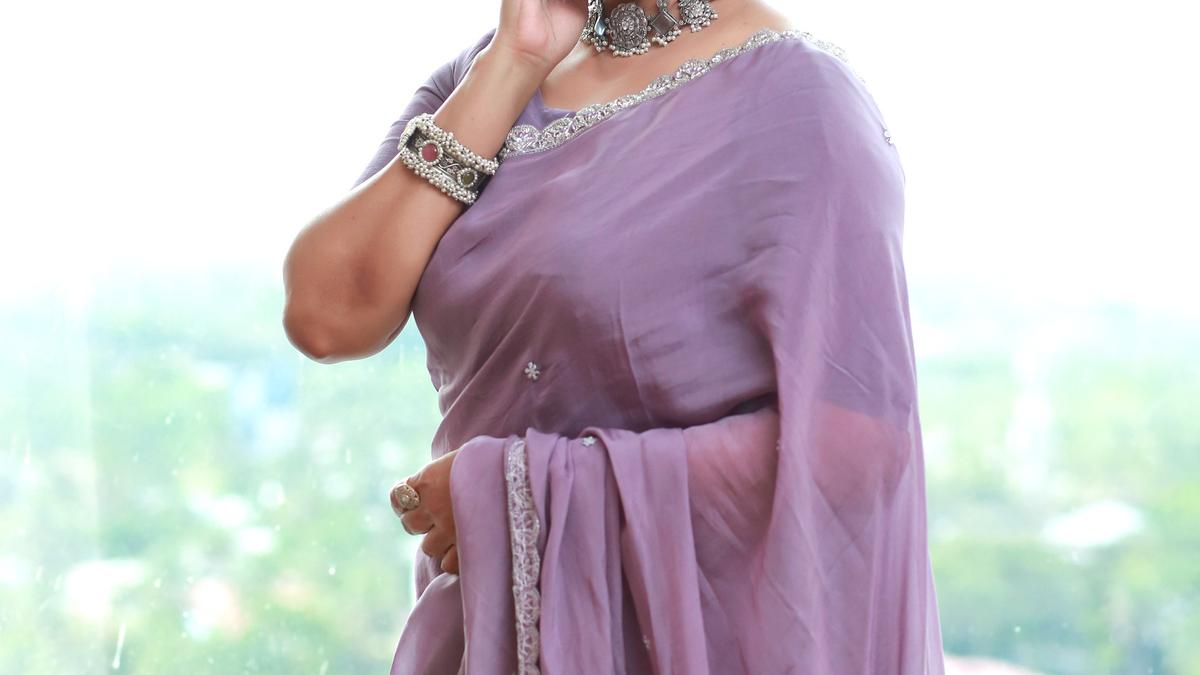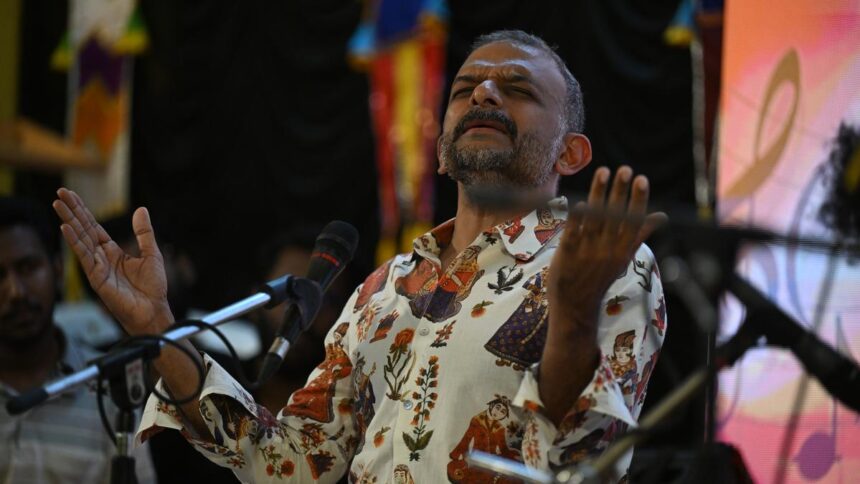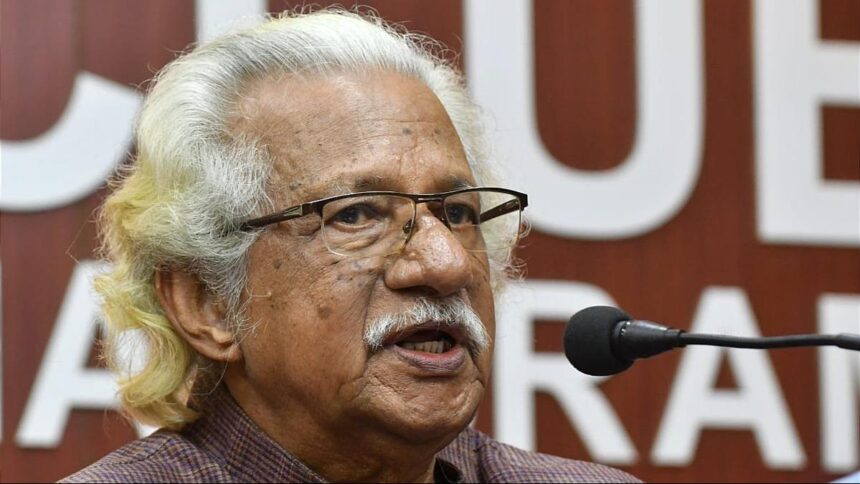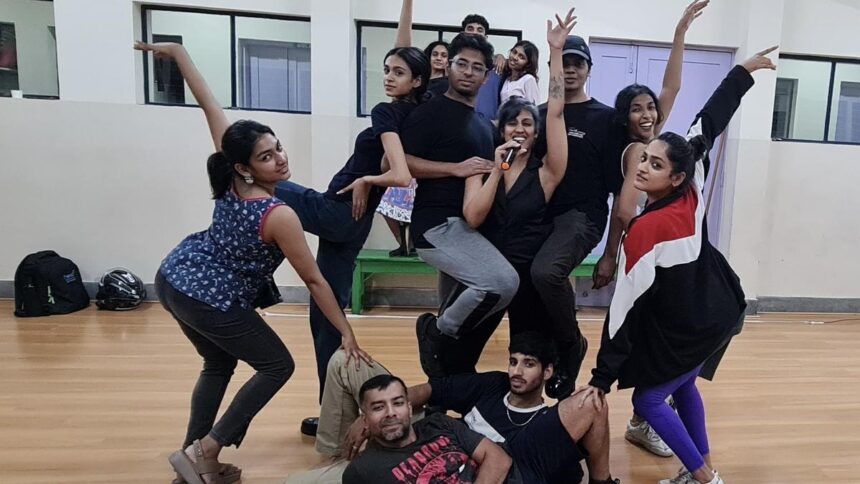Sujatha Mohan began her career at a time when society believed girls should not sing in public. She recently completed five decades in singing, and has a strong fanbase that spans generations.
There are those who remember her as the girl with an angelic voice and smile, a gossamer bow holding up her hair as she sang with popular singer K.J. Yesudas. Some others will recall her early hits such as ‘Kannezhuthy pottuthottu’ (composed by M. K. Arjunan for the Malayalam movie Tourist Bungalow) and ‘Odakkuzhal vili’ (composed by M.G. Radhakrishnan for All India Radio), ‘Kaalai paniyil’ and ‘Oru iniya manadhu’ (both composed by Ilaiyaraaja for the Tamil films Gayathri and Johnny respectively).
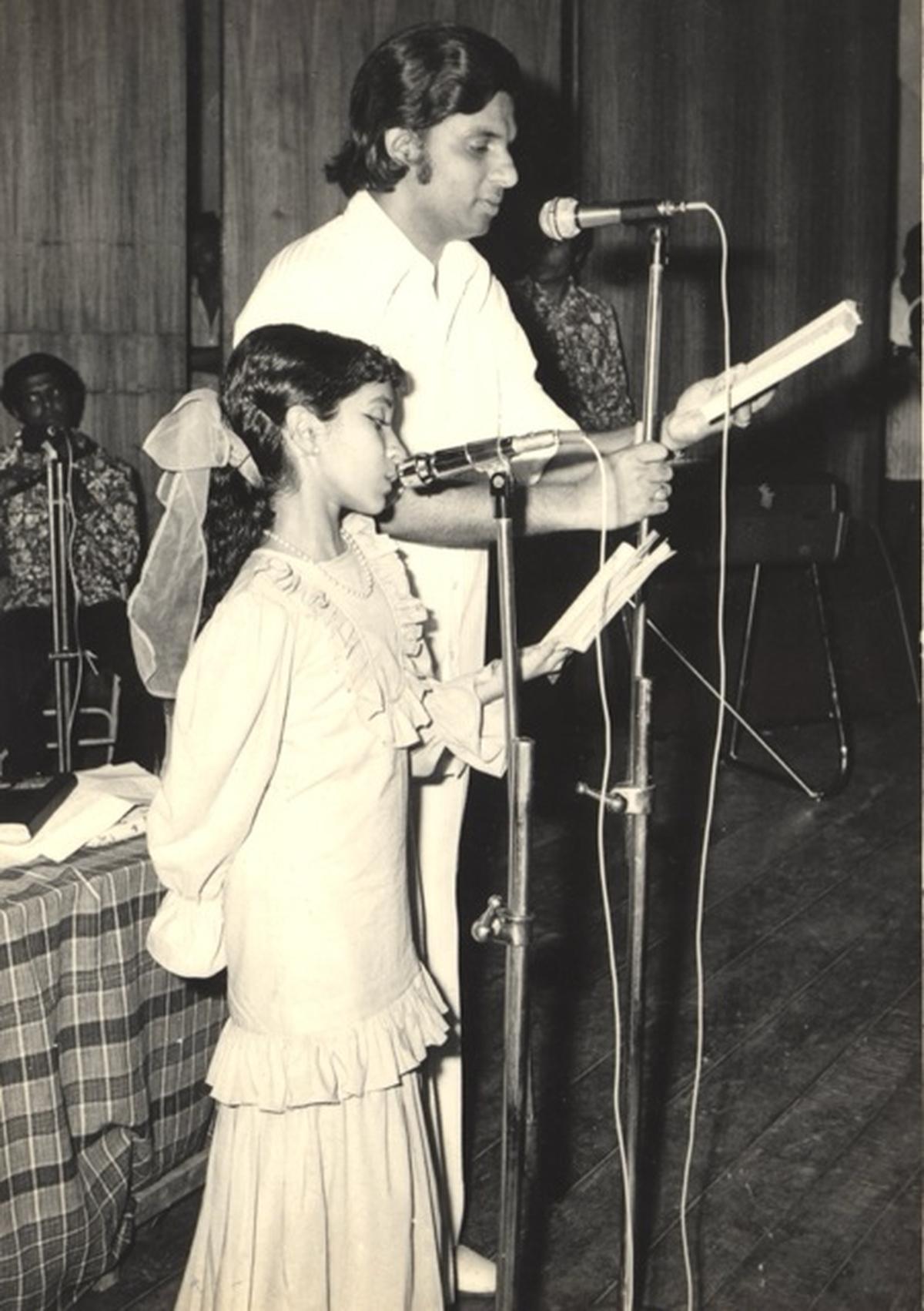
The young Sujatha sharing the stage with veteran singer K.J. Yesudas.
| Photo Credit:
Special Arrangement
Her A.R. Rahman phase in the 1990s is remembered for ‘Pudhu vellai mazhai’ (Roja), ‘Netru illadha maatram’ (Pudhiya Mugam) and ‘Poopookum osai’ (Minsara Kanavu), etc. Today’s teens and young adults know Sujatha more as a genial judge at music reality shows.
Mention all this, and you can sense Sujatha smiling at the other end of the phone. “I’ve always gone with the flow, and it just worked out. Even singing was not something that I planned. It happened. I believe in destiny,” she adds.
Trained in Carnatic music
The way she traverses the octaves with ease shows she is a trained singer. Sujatha learnt Carnatic music from Neyyattinkara Vasudevan and Ochira Balakrishnan, while musicians Rex Isaac and Emile Isaac trained her in light music. “I lost my father when I was just two years old. Because I grew up in a single parent household, there were many restrictions. I remember sneaking into the house at 2 a.m. after stage shows.”
Despite the huge popularity Sujatha enjoyed, the disciplined environment at home ensured she remained grounded. “I was expected to study well and get married. I did that too,” she laughs.
But, once Sujatha realised music is her calling, she put in the work to create her own niche. “I am fortunate to have got the support of stalwarts such as Yesudas, M. Jayachandran, Ouseppachan, Raveendran, Ilaiyaraaja, Rahman, Vidyasagar, Sirpi and Keeravani,” says the singer, who has recorded close to 8,000 songs across languages.
Sujatha sang her way to fame, she took great care of her voice. “I did not want to do anything that would have affected my singing.”
So, Sujatha gave up offers to judge reality shows early on in her career since that would have meant staying put in studios for long hours. Despite all this, she suffered vocal issues in 2010, when even speaking became a chore. But she worked hard to regain her voice.
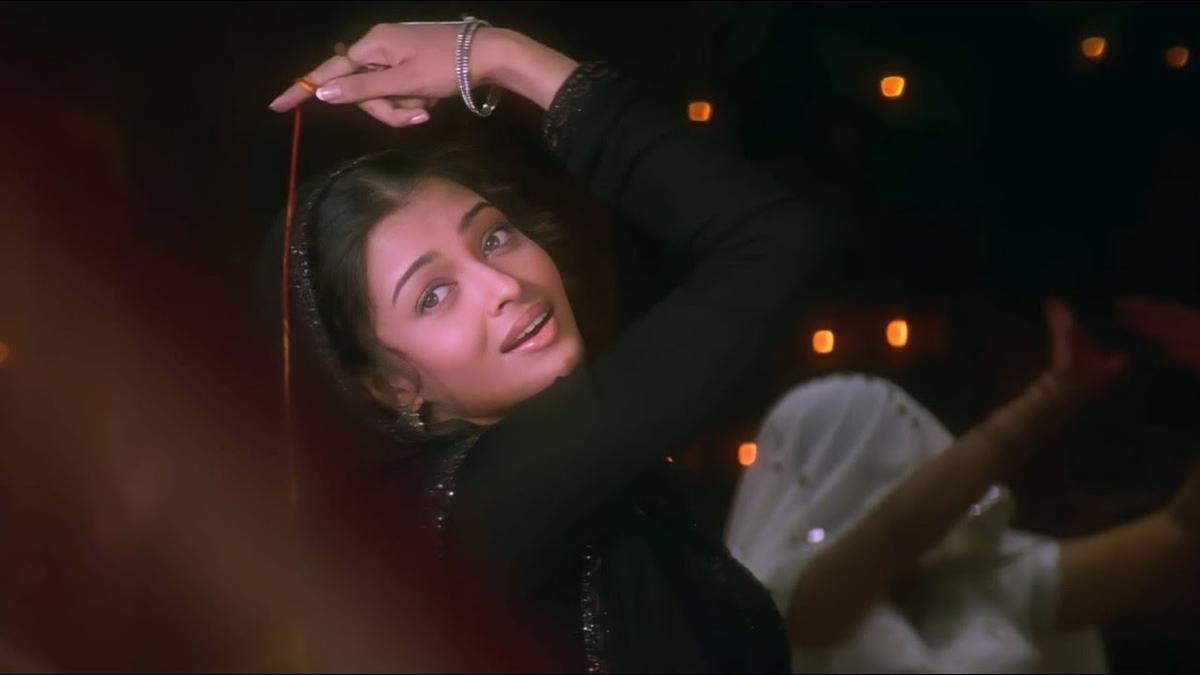
Sujatha has sung ‘Ishq bina’ in Taal with a certain purity of sound that serves the demand of the song.
| Photo Credit:
Special Arrangement
Sujatha’s is a voice that carries a certain wonder for the world around her — think ‘Pudhu vellai mazhai’, and you can imagine someone looking wide-eyed at Nature’s magnificence. If you listen to ‘Ishq Bina’ (from the Hindi film Taal), you experience a fresh, tender love, with innocence filling its depths. There’s a certain purity of sound that serves the demand of the song. The flourishes are there only when needed. Else, what you get is sheer melody.
Over the years, Sujatha says she’s never really found any song difficult or been nervous about getting it right, barring a couple of occasions. “I remember ‘Anandam anandam’ composed by Vidyasagar for Murai Maaman. Unnikrishnan sang the male portion, and it had a lot of Carnatic influences. I wondered if I could manage. When I recently met the film’s producer, he mentioned how I ended up recording it very fast. But, I was not so lucky with ‘Kaathu kaathu dinam kaathu’ for Uzhavan, with music by Rahman. I had a throat infection, and gave up after three or four attempts. Chitra eventually sang the song.” There have also been songs where the popularity was way above the effort. “‘Edho oru paatu’ from Unnidathil Ennai Koduthaen was easy to sing, but I instinctively knew it would go places, because of the emotion behind the song.”
A lifelong student of music, Sujatha even learns from reality shows. “I signed up for these shows, thinking it will be a great chance to pass on acquired knowledge. But, now, I have realised that children are great teachers too. They have a way of simplifying some sangathis with ease. So much so that I would think: ‘Ada, ippadi kooda paadalaama?’ (ah, this can be sung this way too!)”
Sujatha delights in the joy of getting a chance to mould young talent. “Sometimes, you just need to hear two phrases to know a child will go places. It is a privilege to see their growth during the course of the show. I am very attached to these children, and stay in touch. Some like D. Sathyaprakash (Super Singer 3 runner-up) still send across their new work. It feels good to have a ringside view of their journey.” Because she had been a child performer, Sujatha also understands the state of mind of children – their fears and insecurities. “As Baby Sujatha, everything was given to me on a platter. Members of the orchestra always encouraged me. Even later, I never faced any difficulty, because, across industries, I was known as the child who sang with Das anna.”
Even when re-establishing herself after a break, Sujatha kept her spirits up. “I had kept my practice going. And, it helped when I was back behind the mic. Director Priyadarshan called me for Chitram. Then, Rahman entered the scene. A new set of songs came my way.”
Sujatha’s ability to pronounce Tamil words well has impressed many. “My vacations would be in Chennai and so, Tamizh came easily though we did not speak it at home. For pronunciation, I would listen to the songs of P. Susheela amma and S. Janaki amma. Moreover, during recording, the lyricists would be around, guiding us. All these years, I’ve operated only on the principle that every song should be sung like it is one’s debut song. A singer is the first one translating the music composer’s idea into vocals, and it is important to get into the mood of the song. When you think it is your maiden song, you’ll be full of butterflies, and that instils a certain discipline,” says Sujatha. And, while practice and the quest for perfection are important, the singer says, her first take is usually the best.
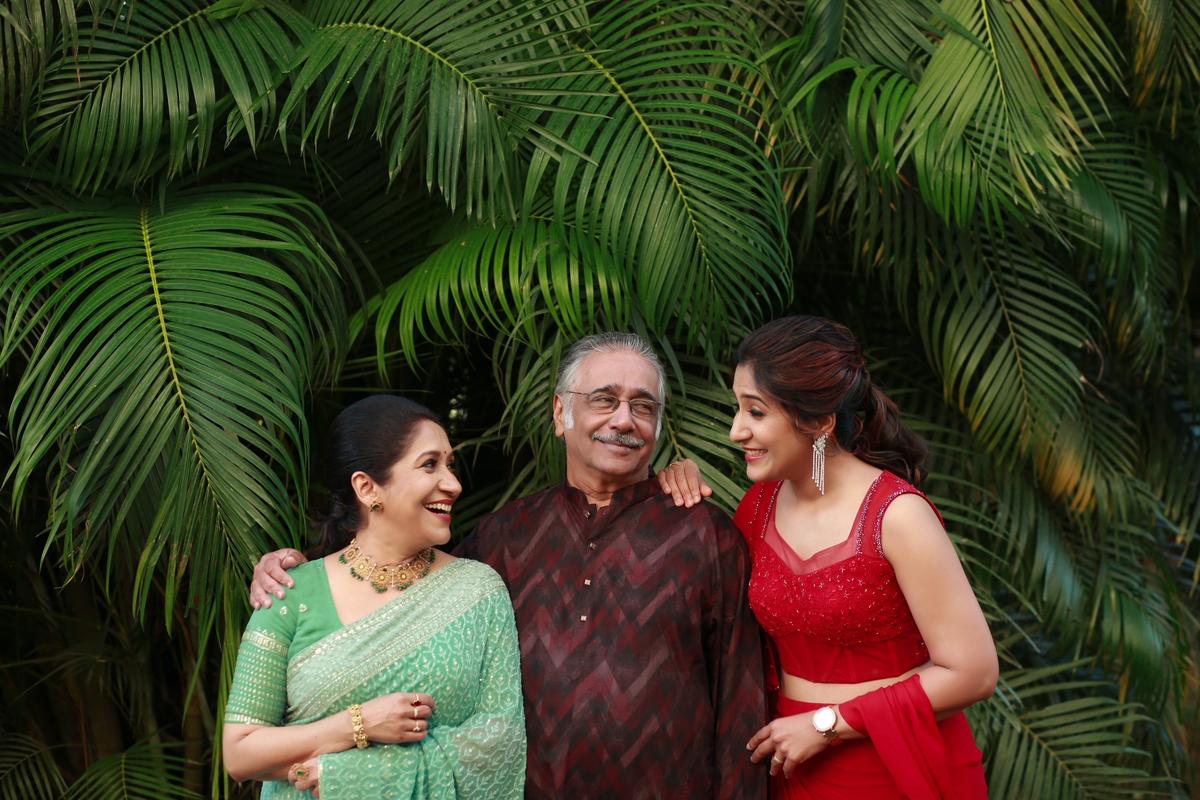
Sujatha with husband Mohan and daughter Shweta, who is also a well-known singer.
| Photo Credit:
Special Arrangement
Carrying forward Sujatha’s legacy is daughter Shweta Mohan, who’s a splitting image of her mother and sounds quite similar too. “She showed spark, but I did nothing to further her career. She figured it out on her own,” she smiles, adding: “A good voice alone won’t do. You need dedication and the ability to learn from one’s mistakes.”
Sujatha used to be a livewire stage performer before she decided to give it up, because she felt she was not able to give her 100 per cent. “People pay, because they like the experience of a live show. And, they should get that. Younger singers who deserve a chance. There are other roles to play in life.”
Sujatha has sung across genres in Malayalam, Tamil, Telugu, Kannada, Hindi and Badaga, but is partial to melodies, especially love songs. She has also recorded devotional numbers. “I like to sing songs with soul, songs that are happy.”
Now, other than private concerts, Sujatha sings for her granddaughter, whom she looks after when Shweta is travelling on work. “My mother was there for me. I have to be there for Shweta. But I hope to sing till I can. It is a joy unlike any other,” says Sujatha.








